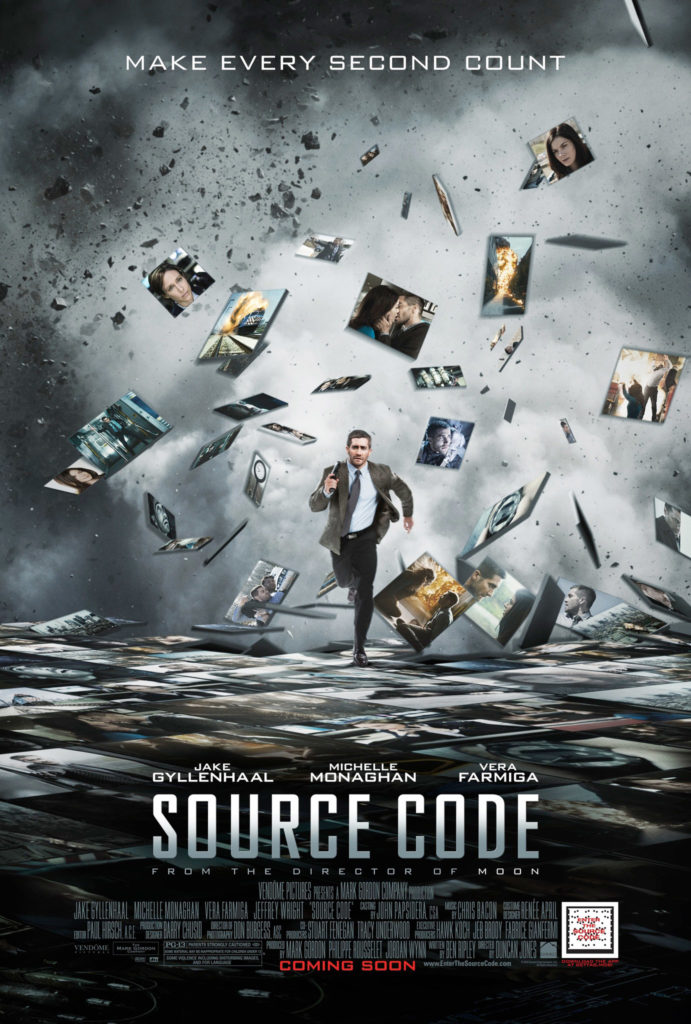Written by Ben Ripley and directed by Duncan Jones, Source Code is a modern terrorism thriller that has an interesting premise. Using technology, a government agency has developed a method of melding a person’s consciousness with the last eight minutes in the life of a dead man. In this case, the dead man is a victim of a terrorist attack on a train that happened that very morning. For those eight minutes, the film’s protagonist, Capt. Colter Stevens (Jake Gyllenhaal), experiences all the sights and sounds the victim did while aboard the train, but this isn’t a replay of recorded events. Colter can move around and interact with the environment, exploring places that were hidden from the view of his deceased avatar, strike up new conversations, etc., all in an effort to find out what happened aboard that train.
As the eight minutes end, the train is engulfed in flame, and Colter must repeat the process over and over again until he discovers who the attackers were. This is urgent, as we learn early on that the attack on the train was a diversion, and a far more deadly attack, in the form of a radioactive dirty bomb, is set to happen in downtown Chicago.
Meanwhile, Colter’s dead man wasn’t travelling alone. Whenever Colter snaps back into the eight minutes, he finds himself sitting across from Christina (Michelle Monaghan), a woman he clearly knows, but the relationship between her and Colter’s dead man is ambiguous. Girlfriend? Co-worker? It’s not clear, but she’s less another mystery to be solved aboard the train as she is a budding romance encapsulated into eight-minute bits that need to be rebooted every time she blows up with the train.
As fantastical as this premise is, things have not been going swimmingly for Colter. Back in the real world, as it were, Colter is a bit confused about what has been happening. The last thing he remembers before his first foray aboard the train is that he was on a mission in Afghanistan, and it had gotten hairy. Now, when he’s not  aboard the train for his eight-minute excursions, he finds himself stuck in an enclosed metal pod. He can interact with others only through a tiny television screen, and then he mainly sees only two people, an Air Force Captain, Goodwin (Vera Farmiga), and her civilian boss, Dr. Rutledge (Jeffrey Wright). Neither of them are forthcoming about the circumstances that brought Colter to where he is, but they assure him the mission he is on now is of utmost importance, that failure could mean the deaths of countless more people. Colter is wary, but he keeps going back to the train for more.
aboard the train for his eight-minute excursions, he finds himself stuck in an enclosed metal pod. He can interact with others only through a tiny television screen, and then he mainly sees only two people, an Air Force Captain, Goodwin (Vera Farmiga), and her civilian boss, Dr. Rutledge (Jeffrey Wright). Neither of them are forthcoming about the circumstances that brought Colter to where he is, but they assure him the mission he is on now is of utmost importance, that failure could mean the deaths of countless more people. Colter is wary, but he keeps going back to the train for more.
The three plots of the film, terrorist attack, romantic subplot, mysterious secret control center, blend nicely together. The what (terrorist attack), couldn’t do without the how (mysterious secret control center), which makes the romantic subplot a bit superfluous, but Christina is a very sympathetic character — the very picture of the innocent victim. Why did this person have to die so senselessly, still so young and vibrant? Little clues had been dropped here and there that she was about to make a big change in her life for the positive, but then we get to see her die every eight minutes. This makes Christina more important than just a pretty face that catches Colter’s eye. She becomes the human motivation, transcending the abstract — the statistics — that bring a terrorist attack back to ground and make it real. When Colter begins to makes connections between his time on the train and the world above it all, there’s hope that maybe he can actually stop the attack on the train, saving Christina and everyone else.
It’s a good growth to the plot. The film could have been just as entertaining if Colter was merely exploring the information that his dead host had taken in before the train explosion, but Ripley decided to let the artificial world of the eight minutes become something that may or may not be real. And that keeps the film from bogging down in a death paradigm. A limit to the amount of time Colter has before the second terrorist attack, the one that would really hurt, keeps it suspenseful. More could have been achieved if rooting out the terrorists had been more of a puzzle, and I count this as a missed opportunity on the part of the film, but it didn’t make me like it any less.
The sci-fi ideas of the plot are outlandish, to say the least, but they’re accessible without being dumb, so that’s a feather in the filmmakers’ caps. The ending ties too neat of a bow on everything, but Source Code is an entertaining film.
